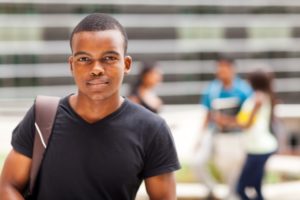How SEAs help make policy meaningful


In August 2019, Ken Bond, Acting Director of the Office of Professional Learning Networks, invited me to contribute to the DOE Digest, a podcast released by the New Jersey Department of Education (NJDOE) tackling statewide issues related to education. I had recently been announced as the Camden County Teacher of the Year and had been asked to share my observations on school climate and culture. On DOE Digest Episode 7: Building the House: Staff Climate and Culture, I defined school “climate [as] the environment we create for teaching and learning. And culture is the home we build to live in. We have to lean on each other all [of] the time, so that culture–that home we live in, has to be really structurally sound.”
State Education Agencies (SEAs) are responsible for building the house that students and educators call home. What I came to learn after being named the 2020 New Jersey State Teacher of the Year was that SEAs must lean on various stakeholders to ensure that all decisions impacting schools are “structurally sound.” As a result of the combined efforts of NJ State Teachers of the Year before me and partnerships with education institutions, I had the unique opportunity to serve with the Office of Professional Learning on a six-month sabbatical and experienced firsthand how SEAs reach far beyond regulation and compliance to meet the needs of all learners. SEAs are uniquely positioned to bring stakeholders together and directly impact school culture by engaging people, programs, and partners.
I immediately connected with the people working at the NJDOE. Most of these individuals had worked as educators prior to their current position and came to the DOE to make a difference statewide. What caught my attention most was that the individuals working for the SEA were most interested in supporting individuals in the field. In conversation with Bev Plein, Director of the Office of Professional Standards and National Milken Educator, she shared her vision as an “opportunity maker” for school leaders, educators, and community members. She was not alone in this philosophy and countless other SEA employees were going beyond data to make a connection with students and educators.
Putting people first at an SEA means designing sustainable programs that fulfill an ongoing need. Red Bank Borough Public Schools, a local education agency (LEAs), follows the motto “It’s people, not programs, that make the difference.” This philosophy is not to say that we should not take measures to meet a long term goal; rather, we should meet people where they are and support their growth. From this understanding, the NJDOE hosts an annual Statewide Equity Conference which creates a space for constructive conversation and collaboration around fairness, access, and opportunity. SEAs can continue providing professional learning by surveying the field and providing comprehensive support based on need. SEAs can also facilitate programs that empower LEAs to turn key the success of their practitioners and create a model that thrives on feedback between agencies. For instance, the “Lighthouse Initiative recognizes districts in New Jersey for illuminating the path toward academic improvement and student success” and prior to school building closures the NJDOE facilitated a professional learning week in which these LEAs opened their doors from around the State to learn about innovative programs and practices. All of these efforts immediately impact school climate and culture.
SEAs thrive in partnership with stakeholders. No decision can be made by the agency alone if it wants the best possible outcomes. Implementation with the input and collaboration of your education partners leads to success and one of the greatest examples of that happened during the pandemic. After Governor Murphy issued Executive Order 104 moving all New Jersey schools to remote instruction, the NJDOE immediately partnered with NJ PBS and the New Jersey Education Association (NJEA) to meet the needs of our most vulnerable learners who did not have access to a device or reliable internet connection. For thirteen weeks, these partners worked together with approximately 200 educators to film from home for public television. Each day there was four hours of educational content in all subject areas for grades 3-6 culminating in 216 total hours of instruction. This collaboration was a herculean effort that preserved school culture for students when they could not enter school buildings and were still guaranteed access to a quality education. SEAs find power in partnership and can leverage these partnerships for greater opportunities in the future.
Although these examples only give us a glimpse into the possibilities of people, programs, and partnership, it is the SEA that brings them all together to make policy meaningful. SEAs work tirelessly in the best interest of our students and educators to promote equity and excellence. As the education landscape continues to change, SEAs will not only play an important role in school culture, they will also be essential in re-envisioning school success.
—
Kimberly Dickstein-Hughes, 2020 New Jersey State Teacher of the Year, teaches English Language Arts at Haddonfield Memorial High School. Hughes earned her bachelor’s and master’s degree from Rutgers University and teaches as an adjunct professor at Rowan University’s College of Education. Hughes’ areas of interest include critical global literacies, culturally responsive teaching, and Shakespeare studies. Hughes has been awarded for her commitment to public service, selflessly contributing her time and effort to better her community. As NJSTOY, Hughes toured NJ public schools, served with NJ Department of Education, and initiated stakeholder collaboration on teacher recruitment, professional learning, and youth voice. Hughes teaches through a social justice and anti-bias framework and believes educational equity can be achieved through radical compassion and collective action.